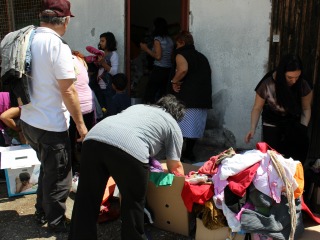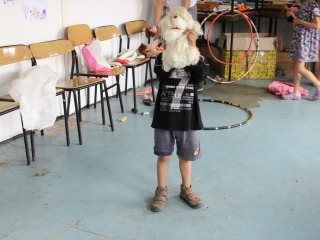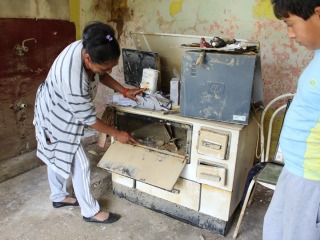Project: Roma in Serbia: How safe they feel and do they see improvements?06Jul2014
Serbian Roma Flood Victims Left High and Dry
 It was three o’clock in the morning of May 16, yet six-year-old Petar was still awake, wondering if the rain would ever stop falling. Wrapped in a blanket, he watched as the water level steadily rise in his backyard as the Kolubara River began to overflow.
It was three o’clock in the morning of May 16, yet six-year-old Petar was still awake, wondering if the rain would ever stop falling. Wrapped in a blanket, he watched as the water level steadily rise in his backyard as the Kolubara River began to overflow. Along with tens of thousands residents of the city of Obrenovac, Peter and his family had to flee their home a few hours later, leaving behind all their world possessions. He now lives in one of the makeshift shelters for flood victims in Krnjaca, a small suburb on the outskirts of the Serbian capital city Belgrade. Thousands were forced to abandon houses and dozens died during the worst Balkan floods in recent history.
Still home to refugees who were placed here ‘temporarily’ after fleeing the violence of the 1990s Balkan wars, Peter and 90 other mainly Roma flood evacuees live cheek by jowl sharing communal toilets and struggling for clothes.
‘Find clothes or go naked’
Walking through the barracks halls, you are first hit by the strong smell of moisture. Shoes are set outside rooms with military precision and all facilities are shared. The rooms themselves are tiny and all contain one bed, a table and a wardrobe. The sense of being imprisoned is overwhelming.
“When they brought us here and I saw how it looks, I did not want to live in barracks. Still, considering the condition my house in Obrenovac is in, this isn’t so bad,” says Peter’s grandmother, Goranka, as she sifts through a pile of donated clothing.
As most fled their homes with only the clothes they were wearing, the bags of donated shoes, T-shirts and jeans are picked over by evacuees desperately searching for their size.
An argument breaks out between two women, one disappointed the other had not told her a fresh lot of second-hand had arrived. “If you manage to find something, you do, and if you don’t, you will go naked,” one refugee says.But evacuees aren’t just struggling to clothe themselves and their families, they must also sign for the drinking water that is distributed once only in the morning. The donated food isn’t up to much either, they say, as Goranka holds up a hunk of stale bread. “For breakfast and dinner it is mostly cans of pasty and fish. For lunch they have cans of beans, peas and goulash, but we warm it up for them. It must be like that because other food would spoil too quickly,” explains Kristina, one of the volunteers that are working here.
Most Refugees in Krnjaca came here after Croatia’s Operation Storm. Now, they don’t have anywhere to return and the state didn’t provide them new homes.
Traumatised children
 This shelter is temporarily home to more than 20 children and volunteers arrive every few days to play with them. Playing entry guard to the playroom, 10-year-old Dejan trains his toy gun on any who would enter. He eventually gives in, allowing his ‘enemies’ to enter the room who can then read the following message daubed on the wall: “Do not touch my playroom.”
This shelter is temporarily home to more than 20 children and volunteers arrive every few days to play with them. Playing entry guard to the playroom, 10-year-old Dejan trains his toy gun on any who would enter. He eventually gives in, allowing his ‘enemies’ to enter the room who can then read the following message daubed on the wall: “Do not touch my playroom.” Perhaps the message is Dejan’s work. Psychologist Ivan Veljkovic has been working with children in shelters from the beginning of floods and started here in Krnjaca just two weeks ago. “The trauma they have been through, the children express it through games and drawing. One time, while we were playing, a child mentioned flooded planet as a game. In another shelter, a girl drew mountains drowning in water. She was on an excursion before the floods and now everything is mixed up in her head,” he says. Just as we entered, Dejan escorts us on our way out the play room with his toy gun firmly in hand.
Return to Obrenovac
Goranka and her grandsons, Petar and Srđan, wait for us anxiously after we agree to take them to visit their home in Obrenovac. This will be the first time the boys have been back since the floods. As we drive, they do not stop asking about what they will find there. At the gate waits Petar’s dog Mrki. Having not seen Mrki in weeks, Petar throws his arms around his pet excitedly. But the excitement abates quickly once the extent of the flood damage becomes clear.
 The water rose to the ceiling of their home and the walls are still damp and marked, furniture and household appliances still covered in mud litter the yard. Petar stumbles upon a ruined box of pencils his parents had bought him for school. He crushes them dejectedly under foot. Eyeing a toilet seat dangling from a nearby tree, Goranka tells us her freezer ended up in a neighbour’s backyard, hundreds of metres away.
The water rose to the ceiling of their home and the walls are still damp and marked, furniture and household appliances still covered in mud litter the yard. Petar stumbles upon a ruined box of pencils his parents had bought him for school. He crushes them dejectedly under foot. Eyeing a toilet seat dangling from a nearby tree, Goranka tells us her freezer ended up in a neighbour’s backyard, hundreds of metres away.Their neighbours’ homes are in a similar condition. Many are Roma refugees from the Kosovan town of Urosevac who ended up here after fleeing the war in Kosovo in 1999.
Andjelina, one of Goranka’s neighbours tells us her husband died shortly after abandoning their home in Kosovo, leaving her with three children to raise. After the floods, she’s been forced to leave her home again. “I am like a bird flying from one bough to another, trying to find its own nest, her own home. But still, I have not made it,” she says.
Almost all houses in the street are marked with owners’ names and phone numbers so the authorities in charge of the flood recovery effort can reach them. People fear they will not be there when help comes.
State aid yet to materialise
One asks us angrily why aren’t photographing their houses, thinking we are from the municipal government and might finally be there to help clean up the mess. Nikola tells us they are yet to receive any help, and what they have been promised won’t cover the repair costs. “They are promising to give us 2,000 euros. What can I do with that? I will take a loan and give them that amount of money, and let’s see if they can fix my house with it,” he says.
Final decision about aid should be given after definitive assessment of damage expected in early July.
The evening is slowly drawing in and people begin to leave Obrenovac and head back to their temporary accommodation, hoping that one day they will be able to move back home. Nobody talks much during our drive back to the Krnjaca barracks. The boys eat chocolate and drink Coca-Cola in silence, while Goranka simply repeats the same sentence from time to time, mourning the loss of her modest home. “Even though we are Roma, we had a nice life.”
Source: BIRN Belgrade, Vladimir Kostic
Photo by Milica Saric



